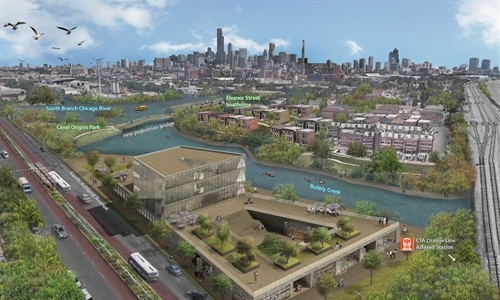
Chicago Department of Transportation
Chicago's downtown riverwalk invites residents, workers and tourists back to the river.
This month we welcome daylight savings, a symbol of longer days where we can now leave work before dark and be confident that spring is upon us. With that comes thoughts of outdoor activities that exemplify Chicago at its best – bike lanes congested with cyclists, beach volleyball and a bustling Riverwalk. This month we are also celebrating a few exciting milestones for the Chicago River!
On March 7, City Club of Chicago hosted Our Great Rivers: What’s next for the Chicago and Calumet. The event was kicked off by Mayor Emanuel, moderated by the Metropolitan Planning Council’s MarySue Barrett and featured Chicago Department of Transportation Commissioner Rebekah Scheinfeld, Metropolitan Water Reclamation District Board of Commissioners President Mariyana Spyropoulos and 11th Ward Alderman Patrick Thompson. Mayor Emanuel summed up Chicago’s changing orientation toward the river: “rather than the river being apart from the city, today the river is a part of our city.”

Our Great Rivers rendering of Ashland at Bubbly Creek calls for new river- and transit-oriented development by the Ashland Orange Line station and a pedestrian bridge.
Each panelist shared their passion for our rivers on a range of issues, including water quality, access for cyclists and pedestrians, community programming and neighborhood development. These projects and priorities are knit together through the Our Great Rivers vision that provides guidance for future investments.
Barrett noted the goal from the vision that excites her most, a continuous riverfront trail built by 2030, recognizing that it “is an ambitious one.” But she challenged folks in the room, reminding them that Des Plaines River trail runs 55 miles from North Avenue to Wisconsin, while the Cal Sag Trail, which is still a work in progress, is now the second most heavily used trail in Illinois, after the Lake Michigan shoreline trail in Chicago.
“People want to be by the water, plain and simple.”
Commissioner Scheinfeld responded to Barrett’s call to action with examples of CDOT’s focus of opening up access to the river for recreation with three bridge projects that will be “transformative in terms of connecting pieces of the puzzle of trail already along the North Branch.” This includes the Riverview Bridge that will connect Clark Park to California Park and the Irving Park Road Bridge, which includes an underbridge connection, linking California Park to Horner Park – thus creating connected riverfront trail from Belmont to Montrose. CDOT expects to begin construction in 2018 to create access to the North Shore Channel at Hood Avenue, which will serve as the final link for continuous multiuse trail connecting four municipalities along the North Shore Channel.

Chicago Dept. of Transportation
Rendering of the Riverview Bridge.
Chicago Urban River Edges Ideas Lab
MPC is thrilled to be teaming up with the Chicago Department of Planning and Development to host the Chicago Urban River Edges Ideas Lab, generously funded by the Richard H. Driehaus Foundation and Comcast. The firms, including Ross Barney Architects, Studio Gang, Perkins+Will, Site Design Group, Skidmore, Owings & Merrill, Adjaye Associates, James Corner Field Operations, SWA and Sasaki will develop concepts that will lead to a unified design aesthetic for Chicago’s riverfront that can help in updating Chicago’s River Edge Design Guidelines, a priority identified in Our Great Rivers. MPC will work with WSP Parsons Brinckerhoff to develop a digital exhibition, including viewing augmented and virtual reality via cell phones and physical installations. Ideas will be shared at this year’s Biennial.
Chicago is not the only city grappling with these challenges. This week, Mayor Emanuel and Paris Mayor Anne Hidalgo co-hosted the Urban Waterways Forum in Chicago to explore “the current impact, challenges, and opportunities that urban waterways present to local governments, stakeholders and citizens.” Mayors from 17 cities around the world participated in a two day forum to discuss challenges and tactics related to water quality, community and economic development and recreation. Mayors from Mexico City, Montreal, Belgrade, Milan, Cape Town, New Orleans, Gothenburg and Shenyang are among those that participated.
Ideas to Action Workshop
From a rivers perspective, 2017 is off to a great start and with the longer days and warmer weather we are increasingly excited about making progress toward the Our Great Rivers vision and we hope you’ll join us. You recently read a recap of our Ideas to Action workshop and the Chicago Community Trust’s Our Great Rivers Request for Proposals. If you are interested in tackling a project in your stretch of the river, be sure to check these resources out!